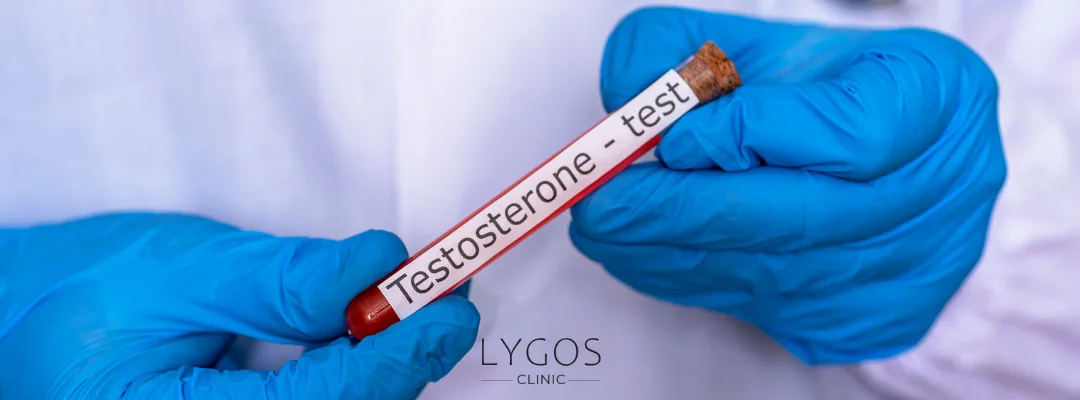Testosterone Deficiency | Symptoms of Testosterone Deficiency

Chose Your Topic
Testosterone Deficiency
Testosterone is a crucial hormone, especially for male health. It regulates many biological processes in the body, and testosterone deficiency can lead to both physical and psychological effects. In this article, we will explore in detail what testosterone does, the causes and symptoms of its deficiency, diagnostic methods, and treatment options.

What is Testosterone?
Testosterone is a naturally produced androgen hormone. In men, it is primarily secreted in the testes, while in women, it is produced in smaller amounts by the ovaries and adrenal glands. In males, it is mainly responsible for the changes seen during puberty, such as deepening of the voice, muscle development, and increased body hair.
Testosterone also plays key roles in:
- Sperm production
- Sexual desire (libido)
- Muscle and bone density
- Production of red blood cells
- Mood regulation
Because of these important functions, a decrease in testosterone levels can lead to various health problems.
What is Testosterone Deficiency?
Testosterone deficiency occurs when blood testosterone levels fall below the normal range. In medical literature, this condition is known as hypogonadism. It can be congenital (present at birth) or develop later in life. In men, testosterone levels naturally decline with age, but in some individuals, this decline can reach levels that negatively impact health.
Generally, a total testosterone level below 300 ng/dL in adult men is considered low and may cause various physical and psychological symptoms.

Causes of Testosterone Deficiency
There are many causes of testosterone deficiency, which are categorized into two main groups:
- 1. Primary Hypogonadism (Testicular Origin)
Occurs when the testes fail to produce adequate testosterone. Causes include:
- Genetic conditions like Klinefelter syndrome
- Orchitis (inflammation of the testes)
- Trauma to the testicles
- Cancer treatments (chemotherapy/radiotherapy)
- Undescended testicles
- 2. Secondary Hypogonadism (Hypothalamic or Pituitary Origin)
Occurs when hormonal signals from the hypothalamus or pituitary gland in the brain are insufficient. Causes include:
- Pituitary tumors
- Excessive stress
- Obesity
- Severe infections
- Anorexia or other eating disorders
- Chronic illnesses (e.g., diabetes, kidney or liver diseases)
Additionally, aging, alcohol or substance use, poor sleep habits, and certain medications can negatively affect testosterone levels.
Symptoms of Testosterone Deficiency
Individuals with low testosterone may experience various symptoms. These usually develop over time and can often be mistaken as a normal part of aging. However, persistent and widespread symptoms may indicate an underlying hormonal imbalance.
- Physical Symptoms:
- Reduced sexual desire (low libido)
- Erectile dysfunction
- Decreased sperm production, infertility
- Decrease in muscle mass
- Reduced body hair
- Enlargement of breast tissue (gynecomastia)
- Loss of bone density (osteoporosis)
- Weight gain, especially abdominal fat
- Fatigue and low energy
- Psychological Symptoms:
- Depressed mood
- Anxiety
- Memory and concentration issues
- Lack of motivation
- Sleep disturbances
These symptoms may also signal other health problems. However, if several occur simultaneously, it is important to check testosterone levels.
What is a Total Testosterone Test?
The total testosterone test is the most common method for determining testosterone levels in the blood. It measures both bound and free testosterone. This test is usually conducted in the morning on an empty stomach, as hormone levels are highest at that time.
- CoolSculpting
- Normal: 300–1000 ng/dL
- Low: <300 ng/dL
- Borderline: 300–400 ng/dL (may require free testosterone testing)
In some cases, free or bioavailable testosterone measurements are also needed. Additional hormone levels like LH, FSH, and prolactin may be assessed depending on the doctor’s evaluation.

Treatment of Testosterone Deficiency
Once diagnosed, the appropriate treatment plan is determined based on the individual’s age, symptoms, and overall health. The most common treatment is testosterone replacement therapy (TRT).
- 1. Testosterone Replacement Therapy (TRT)
This therapy involves administering testosterone externally to replace the deficient hormone. Common forms include:
- Gel/Transdermal: Applied to the skin daily.
- Injections: Administered intramuscularly, weekly or monthly.
- Subcutaneous Implants: Provide long-term effects.
- Oral Tablets: Less commonly used, may have side effects.
- 2. Lifestyle Changes
In cases of mild testosterone deficiency, lifestyle modifications can be effective:
- Regular exercise, especially resistance training
- Healthy, balanced diet
- Adequate sleep
- Stress management
- Avoiding alcohol and smoking
- Weight control
- 3. Treating Underlying Conditions
If another condition is causing the deficiency, addressing that illness is essential. For example, managing a pituitary tumor or insulin resistance can help restore hormone balance.
Warning: Testosterone therapy is not suitable for everyone. It must be used cautiously, especially in individuals at risk for prostate cancer. A thorough medical evaluation is essential before beginning treatment.
Testosterone is a key hormone in maintaining male health. Prolonged deficiency can significantly reduce quality of life. Recognizing the symptoms early and consulting with an endocrinologist allows for accurate testing and effective treatment to restore hormonal balance.
Testosterone Deficiency Frequently Asked Questions (FAQ)
Testosterone levels typically start to decline naturally after the age of 30. However, the pace and impact vary between individuals.
No. Women also produce testosterone in smaller amounts, and deficiency can cause symptoms in both genders, although it’s more prominent in men.
It is recommended to perform the test in the morning on an empty stomach, as testosterone levels are highest at that time.
Some testosterone treatments can suppress sperm production. Those who wish to have children should discuss options with their doctor.


